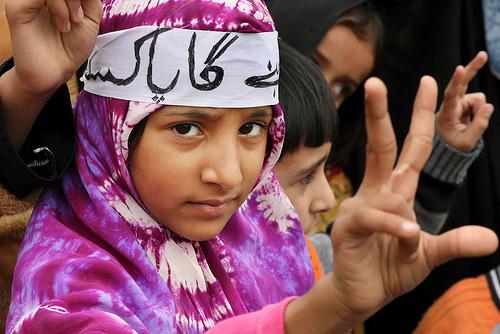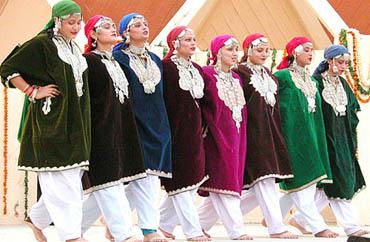pak101

Age: 44 
5525 days old here
Total Posts: 2242
Points : 48969
Location:
Karachi, Pakistan
Status : Offline |
Subject : Kashmir Solidarity Day - 5th February
Every year since 1991 the people of Pakistan observe the 5th of February as a day to express solidarity with the people of Kashmir, who have been struggling and rendering unparalleled sacrifices to achieve their birthright, the right to self-determination, for the past six decades.
To understand the importance of the observance of Kashmir Solidarity Day, one needs to understand the history of India’s occupation of Kashmir, which dates back to the partition of the subcontinent in 1947 after a century of British rule. According to the Indian Independence Act and Partition Plan of June 3, 1947, passed by the British Parliament on July 18, 1947, the Indian British colony was to be divided into two sovereign states. The Hindu-majority areas were to form India and the Muslim-majority areas of Western provinces and east Bengal were to be included in the state of Pakistan.
Under the criterion of partition, the princely states had to accede either to Pakistan or to India, keeping in consideration the geographical situation and communal demography. Being a Muslim-majority state, with an 87% Muslim population, Kashmir had a natural tendency to accede to Pakistan, but the evil designs of its then Hindu ruler, Maharaja Hari Singh, and the Indian National Congress paved the way to destroy the future of millions of people of Kashmir. India occupied the state by deploying its army there on October 27, 1947, in total disregard to the spirit of the partition plan and against the Kashmiris’ aspirations. 
The people of Kashmir did not accept the illegal Indian occupation from day one and have been conducting their liberation struggle ever since. They started an armed struggle supported by a public uprising. On January 1, 1948, India approached the United Nations Security Council, which in its successive resolutions, accepted by both Pakistan and India, approved a ceasefire, demarcation of a ceasefire line, and demilitarization of the state and called for a free and impartial plebiscite to be conducted by the UN. The demarcation of ceasefire resulted in dividing Kashmir into two parts, Azad Jammu and Kashmir and Indian Occupied Kashmir. Phase one of the UN resolutions -- the ceasefire -- was implemented while demilitarization of the territory and the holding of a plebiscite under the UN umbrella remains unimplemented till this day.
The most deplorable aspect of the Kashmir dispute is that India itself had taken the issue to the United Nations but later backed away from the promises it had made in front of the international community regarding the settlement of the dispute and allowing the people of Kashmir the right to self-determination. The people of the occupied territory, after seeing the failure of all peaceful means aimed at settling the Kashmir dispute, started a massive uprising in 1989 to secure their right to self-determination, which gained momentum with every passing day, forcing India to sit down at the negotiation table with Pakistan. But the most lamentable aspect of the picture is that while Pakistan demonstrated considerable flexibility in the dialogue process, India’s intransigent approach continues to remain the biggest obstacle in the way to resolution of the Kashmir dispute. Despite the continuation of the dialogue process between India and Pakistan and the initiation of the Confidence Building Measures (CBMs) between the two countries and across the Line of Control (LoC), the situation on the ground in the occupied territory remains unchanged as the Indian troops have broken all records of human rights violations by killing innocent people, arresting youth, disgracing and harassing women, and setting residential houses ablaze with impunity. Ironically, instead of taking the mammoth anti-India protest demonstrations in the second half of 2008 as Kashmiris’ referendum against the Indian illegal occupation of their soil, India staged another election drama to hoodwink the international community and to impose another puppet administration on Kashmiris. During an election process lasting more than a month, the occupation authorities placed the entire Hurriyet leadership in jails or under house arrest and kept the entire Kashmir Valley under siege. Pakistan has repeatedly emphasized that it would never accept any option for the resolution of the core issue between Pakistan and India, which goes against Kashmiris’ aspirations. Pakistani President Asif Ali Zardari and Prime Minister Syed Yousaf Raza Gilani have repeatedly said that Kashmir belongs to the Kashmiris and they are the arbiters of their fate. Historically speaking, there are several reasons why Pakistan and its people express solidarity with Kashmiris. The most striking are the common cultural, ideological, geographical, and emotional bonds, which for centuries have tied the people of both areas into one unity. Moreover, the people of Pakistan rightly feel that Kashmir is the unfinished business of the partition of the subcontinent. The core issue of Kashmir, between India and Pakistan, has led Pakistan to face three wars and have devoted a major portion of their national incomes to defense budgets. World leaders have stressed the need to resolve the Kashmir dispute between India and Pakistan to avoid an eventuality that may cause a catastrophe in the region. This is the context of observing Kashmir Solidarity Day. Thus the 5th of February is a day to acknowledge Kashmiris’ struggle for justice, peace, truth, and fundamental human rights. Source: TehranTimes
no likes.
|